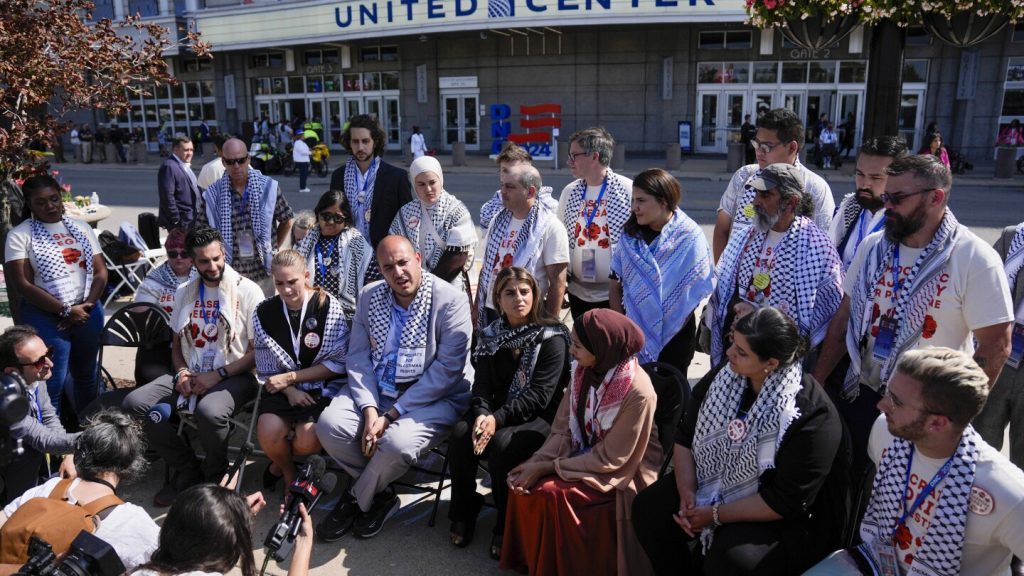Leaders of an “Uncommitted” movement have been negotiating for weeks to secure a speaking slot for a Palestinian American at the Democratic National Convention, in protest of the Israel-Hamas war. After the DNC denied their request, the leaders staged a sit-in outside the United Center in Chicago, where the convention is being held. They vowed to remain until their request was granted or the convention ended on Thursday night. This has exposed cracks in the Democratic Party, which has otherwise rallied around the Harris campaign that has energized the majority of party members this week.
The party’s refusal to allow a Palestinian American speaker at the convention, following the appearance of the parents of an Israeli American hostage held by Hamas, sparked criticism from some on the left. The United Autoworkers Union, which supports Vice President Kamala Harris, called for a Palestinian American speaker to be heard. Despite the pushback, party leaders have not budged on their decision. Tensions over the war in Gaza have also spilled outside the convention center, with protests and clashes taking place. Leaders like Minnesota Attorney General Keith Ellison have emphasized the importance of the messenger in delivering messages of peace and unity.
Amid calls for the party to reconsider the decision, various Democratic leaders have expressed support for including a Palestinian American speaker at the convention. The “Uncommitted” movement provided potential candidates, such as Georgia State Rep. Ruwa Romman, who outlined demands for a cease-fire and an end to the killing of Palestinians. Earlier in the week, activists were given space at the convention to address the situation in Gaza and share personal stories about the conflict. While Harris has officially been nominated as the Democratic Party’s presidential nominee, those advocating for a cease-fire believe they can still influence the upcoming election.
The movement’s demands for a Palestinian American speaker reflect the growing influence of Arab American voices, particularly in key swing states like Michigan. The UAW, with a significant presence in Michigan, has also called for a Palestinian American to have a speaking role at the convention. Democrats entering the convention have interacted with the “Uncommitted” delegates and expressed solidarity with their cause. Rep. Cori Bush, a member of the progressive congressional group known as the “Squad,” emphasized the importance of hearing diverse voices within the party. Despite the DNC’s refusal, the movement shows no signs of backing down in their push for representation.
The sit-in outside the convention center represents a challenge to the Democratic Party’s unity, as tensions over the Israel-Hamas conflict continue to play out within the party. While leaders like Chicago Mayor Brandon Johnson have voiced support for including a Palestinian American speaker, others have defended the party’s decision. New York Sen. Chuck Schumer emphasized the importance of unity within the party and downplayed the significance of the sit-in. Ultimately, the movement’s persistence highlights the ongoing debate within the Democratic Party regarding the representation of diverse voices and the handling of international conflicts.
As the convention comes to a close, the impact of the “Uncommitted” movement’s sit-in and their efforts to secure a Palestinian American speaker reverberates throughout the Democratic Party. While the majority of delegates have shown support for the Harris campaign, the presence of dissenting voices serves as a reminder of the complex challenges facing the party. Whether the DNC will reconsider its decision or maintain its stance remains to be seen, but the movement’s activism reflects a broader desire for inclusivity and representation within the party. The ongoing debate over the Israel-Hamas conflict and the call for a cease-fire demonstrate the diverse perspectives and concerns within the Democratic Party as it looks towards the upcoming election.


